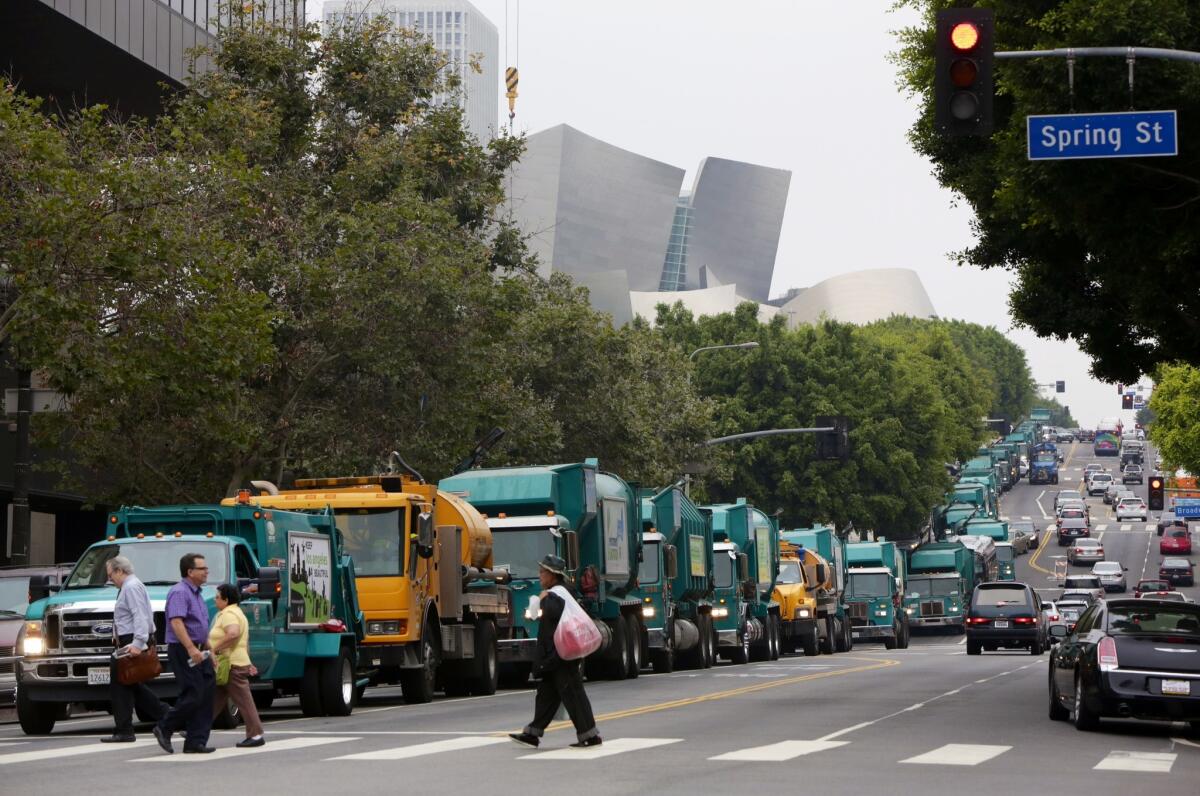Opinion: Honking garbage trucks in L.A.: That’s no way to deal with Wall Street

A coalition of city labor unions and community activists say big banks preyed on Los Angeles and other municipalities, locking them into interest rate swap deals that ended up costing taxpayers millions of dollars after the economic crash.
So, how do they show their anger at Wall Street? By driving city garbage trucks and other heavy equipment around downtown, honking their horns. That’ll show those heartless bankers!
Really, the protest is aimed at pressuring the City Council to take a hard line with the banks: Bank of New York Mellon and Dexia, a Franco-Belgian institution. Councilman Paul Koretz introduced a motion several months ago calling on the two banks to renegotiate credit default swaps contracts with the city at no cost. If the banks refused, he wanted the City Council to terminate business with the banks. On Monday, the council’s Budget and Finance Committee considered his proposal.
Reporter Soumya Karlamangla, who covered the meeting, explained that the city made interest rate swap deals with those two banks in 2006. The deals seemed advantageous because they locked in what was then a historically low interest rate for city bonds. Then the financial crisis hit and interest rates became even lower, but the city’s contracts locked in the higher rates. There’s no allegation that Bank of New York Mellon or Dexia misled the city or acted improperly. This is simply a case of changing market conditions.
The Fix L.A. Coalition has said these deals are costing Los Angeles money that could pay for city services. It wants L.A. to take a harder line with big banks.
The problem, said Natalie Brill, the city’s chief of debt management, is that it may cost the city more money to send a message to big banks than to just stick with the current contracts. A report from her office suggested the deals will save money by the time they expire in 2028 — and more important, it would cost the city $25 million in termination fees to break the contracts.
It’s fair for the Fix L.A. Coalition and City Council members to ask whether the city should try to renegotiate those contracts. A customer can always ask for a better deal. And it’s fair to question whether the city is getting the best rates from its banks.
But the reality is that there is no value to taxpayers in punishing the big banks just for the sake of sending a message. L.A. leaders have confronted this issue before. Several years ago, at the height of the recession that was triggered in part by toxic mortgage schemes created by big Wall Street banks, City Council members proposed removing city deposits and pension fund investments from banks that weren’t making enough loan modifications or other fixes to prevent foreclosures. But the city’s own financial advisors warned that severing ties with the big banks would cost tens of millions of dollars in termination fees and higher interest rates. Instead, the city passed rules requiring greater disclosure on local loans and foreclosure rates by banks that do business with L.A.
In the end, the council’s Budget and Finance Committee made the right call. The city should try to renegotiate with the banks. If the banks refuse to negotiate or terminate the deal at no cost, the city will have the city’s financial advisor analyze the risks and benefits of terminating the contracts.
It’s crucial that City Council members understand the ramifications of canceling banking deals. The sounds of honking garbage trucks outside City Hall shouldn’t drown out discussion of the potential costs to taxpayers of sending a message to Wall Street.
For more opinions, follow me @kerrycavan
More to Read
A cure for the common opinion
Get thought-provoking perspectives with our weekly newsletter.
You may occasionally receive promotional content from the Los Angeles Times.











